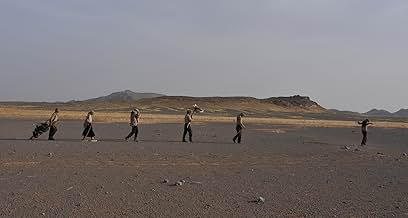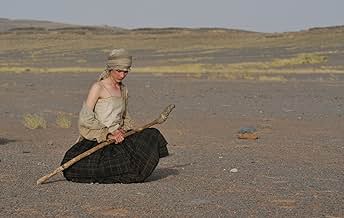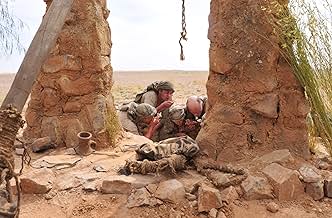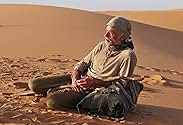Les évadés du goulag sibérien parcourent 6 000 kilomètres à pied pour trouver la liberté en Inde.Les évadés du goulag sibérien parcourent 6 000 kilomètres à pied pour trouver la liberté en Inde.Les évadés du goulag sibérien parcourent 6 000 kilomètres à pied pour trouver la liberté en Inde.
- Réalisation
- Scénario
- Casting principal
- Nommé pour 1 Oscar
- 4 victoires et 5 nominations au total
Gustaf Skarsgård
- Voss
- (as Gustaf Skarsgard)
Zachary Baharov
- Interrogator
- (as Zahari Baharov)
Sally Brunski
- Janusz's Wife, 1939
- (as Sally Edwards)
Dejan Angelov
- Andrei
- (as Deyan Angelov)
Mariy Rosen
- Lazar
- (as Marii Grigorov)
Nikolay Stanoev
- Yuri
- (as Nikolai Stanoev)
Avis à la une
Peter Weir's first film in seven years is another exercise in sturdy direction with strong social themes running through it - recalling many of his previous works in style and content. It follows a group of escaped prisoners from a Siberian gulag in 1940 as they brave the treacherous wilderness of Asia for freedom from the Soviet regime. It's tough viewing for the most part but there is a surprising amount of comic relief along the way, provided chiefly by Colin Farrell's salty character. The group scavenge for food, even fighting off wolves for the carcass of an animal at one point - but the constant bickering and relentless doom and gloom does begin to wear. The film picks up however once Saoirse Ronan enters the picture and her youthful feminine presence brings an interesting dynamic. Emoting with a flawless Polish accent (almost like a mini-Streep) her character is one of the more compelling and layered and gives this emerging young actress a chance to display her skills. The cinematography is serviceable but hardly spectacular - capturing a harsh, arid landscape as opposed to Malick-like celebration of nature.
As the film wears on, the struggle to survive intensifies, particular when they reach the Ghobi desert - the scenes are very well done but viewing becomes quite grueling. Harris bring a certain integrity to his role in a rather unshowy performance with not much character introspection (I can see why his Oscar buzz has disappeared). In fact character development across the board is quite lacking, and watching the plot unfold, with the knowledge of the outcome of the story already provided in the opening titles - the narrative becomes quite arbitrary and the story doesn't always sustain interest. The final leg of the journey through the Himalayas almost seems rushed compared to the bloated second act. Still, it's a very well-made film with good acting and visuals - just don't expect to be inspired.
As the film wears on, the struggle to survive intensifies, particular when they reach the Ghobi desert - the scenes are very well done but viewing becomes quite grueling. Harris bring a certain integrity to his role in a rather unshowy performance with not much character introspection (I can see why his Oscar buzz has disappeared). In fact character development across the board is quite lacking, and watching the plot unfold, with the knowledge of the outcome of the story already provided in the opening titles - the narrative becomes quite arbitrary and the story doesn't always sustain interest. The final leg of the journey through the Himalayas almost seems rushed compared to the bloated second act. Still, it's a very well-made film with good acting and visuals - just don't expect to be inspired.
I think it's always difficult to portray hardship and endurance in films purely because you only experience it for a couple of hours or so. This had me understanding the terrible conditions for real....i think. The search for water in the Gobi desert had me thinking twice about attempting the same thing as a holiday. Make up was fantastic and the bleakness of the scenery was soo beautiful
Six-time Academy Award nominated director Peter Weir ("Master and Commander: The Far Side of the World", "The Truman Show") directed and wrote the adaptive screenplay for "The Way Back" based on the book "The Long Walk: A True Story of a Trek to Freedom" by Slawomir Rawicz, a Polish POW from the Soviet Gulag where the story begins, and on real life accounts of the journey. The film unluckily missed a very well deserved 2010 Oscar birth telling the tale about an unthinkable journey of kinship created between a diverse group of Soviet Gulag escapees. Their journey covers 4,000 miles from Siberia to freedom in India giving meaning to the word incredible. The cinematography is used most majestically by capturing panoramas of the strikingly dangerous yet breathtakingly beautiful landscapes. The splendor of the film goes beyond the wilderness with the selection of a very accurate and diverse cast starring Jim Sturgess ("21"), Ed Harris ("The Rock"), Colin Farrel ("In Bruges"), Saoirse Ronan ("The Lovely Bones"), and Mark Strong ("Sherlock Holmes"). Together they recreate the peril and wonder of the impossible journey on foot that started with the idea of a man named Khabrov (Strong) to break out of the Godforsaken Soviet Gulag in Siberia. A Polish man named Janusz, driven by the fire to get back to his wife, puts the idea into action. An older, wise American known as Mr. Smith (Harris) joins ranks when he hears about Janusz's plans and warns him that Khabarov never had any aspiration to actually leave the place. However, the idea becomes a reality attracting an indebt prisoner named Valka (Farrel) and four other men escaping the Gulag and meeting a young girl named Irena (Ronan) on the path to freedom.
The story is synonymous with walking more than a marathon every day through harsh terrain, uncontrollable elements and lack of food and water for an open-ended amount of time. The gravity of the story is unmatched by any film released this year; told through the art of cinematography and the acting talents of the cast. Both Oscar worthy aspects of the film, however, the cinematography itself is unmatched by any 2010 film. Also, a lot can be said about the all-star cast concerning Jim Sturges, Ed Harris, Colin Farrel, Mark Strong, and Saoirse Ronan and their superb character portrayals; however, there is one other actor that stands out. A man in the group named Zoran played by Dragos Bucar is able to break through the thin layer of dramatic tension in the film with his clever social humor. The comedy he creates does not take away from the story and instead adds to the story allowing the characters to unwind and have a good time.
The outcomes to films within the "jailbreak" genre are inevitably easy to predict, therefore, causing films like "The Way Back" to work hard in order to be original. "The Way Back" does a very good job by differentiating the way it is captured on film through its beautiful cinematography; however, great films such as "The Shawshank Redemption" and "The Great Escape" will always be on top of the genre. "The Way Back" isn't far off though with its main shortcoming stemming from the ending relying on a storyline tangent not fully developed (not the montage, the montage is great).
This is the most underrated movie of 2010 with its limited advertising exposure, release and lack of award fulfillment with only one Oscar nomination for Best Make Up (well deserved as the group of survivors' skin is torn apart by the elements). A 4,000-mile true story taking place in the World War II era with excellent cinematography and great acting seems like the ideal candidate for the Oscars. So why was this must see film left in the shadows?
The story is synonymous with walking more than a marathon every day through harsh terrain, uncontrollable elements and lack of food and water for an open-ended amount of time. The gravity of the story is unmatched by any film released this year; told through the art of cinematography and the acting talents of the cast. Both Oscar worthy aspects of the film, however, the cinematography itself is unmatched by any 2010 film. Also, a lot can be said about the all-star cast concerning Jim Sturges, Ed Harris, Colin Farrel, Mark Strong, and Saoirse Ronan and their superb character portrayals; however, there is one other actor that stands out. A man in the group named Zoran played by Dragos Bucar is able to break through the thin layer of dramatic tension in the film with his clever social humor. The comedy he creates does not take away from the story and instead adds to the story allowing the characters to unwind and have a good time.
The outcomes to films within the "jailbreak" genre are inevitably easy to predict, therefore, causing films like "The Way Back" to work hard in order to be original. "The Way Back" does a very good job by differentiating the way it is captured on film through its beautiful cinematography; however, great films such as "The Shawshank Redemption" and "The Great Escape" will always be on top of the genre. "The Way Back" isn't far off though with its main shortcoming stemming from the ending relying on a storyline tangent not fully developed (not the montage, the montage is great).
This is the most underrated movie of 2010 with its limited advertising exposure, release and lack of award fulfillment with only one Oscar nomination for Best Make Up (well deserved as the group of survivors' skin is torn apart by the elements). A 4,000-mile true story taking place in the World War II era with excellent cinematography and great acting seems like the ideal candidate for the Oscars. So why was this must see film left in the shadows?
This is a wonderful film that is completely unpretentious, has no explosions, maltreated corpses or dramatic emotional outbursts, but a stringent and focused narrative, good camera work and above all great actors, all together as an ensemble. And even though we know that Ed Harris and Colin Farrell are always worth their money, especially Farrell as a Russian criminal is an absolute highlight. How he goes from being brutal, then self-doubting to a social being is very well directed by Peter Weir, but played by Farrell in a truly stunning way. Halfway through the film, a fresh, new color comes into play with Saoirse Ronan. Weir builds up the story well, maybe the hike through the Himalayas is a little too short, but at that point we already understood what drives the small troop of survivalists. A true gem.
The story of a small group of people escaping from a Siberian Soviet prison, part of the "Gulag" in wartime and walking 4000 miles to freedom looked a trifle grim in the trailer, but Peter Weir has managed to produce a rather beautiful film out of it, using Bulgaria and Morocco as locales rather than Siberia and the Gobi desert. Only Darjeeling in India plays itself. My only trouble with it is the rather uneven character development. The story lends itself to ensemble playing but we learn little about two or three of the walkers. In the case of the lead character Janusz (Jim Sturgess) who is the source of the story this is explicable as we are seeing the others though his eyes, but it has to be said that both "Mr Smith" (the excellent Ed Harris) and the Girl (Saiorse Ronan) leave a lasting impression.
I know there is some doubt as to the authenticity of the story, taken from a 1955 book by Slavimir Rawicz a former Polish army officer, and indeed what the group are supposed to have done looks impossible but that's not a problem, because the relationships ring true. It is remarkable how an almost random collection of individuals, including one with a very unsavoury past, can, driven by sheer necessity, wind up functioning as a team. Partly this is due to the leader actually having some navigational knowledge and therefore inspiring confidence in the others. Mr Smith remarks early on that the Janusz has a serious weakness; he is kind, but when the chips are down we see that even the hard-bitten Mr Smith is capable of compassion.
Strangely enough, after the initial scenes in the prison camp, and the escape, there is not a lot of drama. The group encounter very few people on their travels and those they do meet take little interest in them (perhaps they had not heard about the bounty for escapees). Obtaining food and water is obviously a big issue, so mind out for the messy hunting scenes. I was astounded at how well their footwear stood up to the punishment; my hiking boots are not good for 400 miles let alone 4000. Actually they must have wandered around a bit - the northern end of Lake Baikal and Lhasa in Tibet are about 1800 miles apart, though the prison camp was somewhere north of the lake. It's also not clear how long the walk took, but at times it seemed like years. Weir's great achievement is to keep us watching a very drawn out tale. Personally I think I would have died of boredom if I had been in this particular walk, if starvation hadn't got me first.
I know there is some doubt as to the authenticity of the story, taken from a 1955 book by Slavimir Rawicz a former Polish army officer, and indeed what the group are supposed to have done looks impossible but that's not a problem, because the relationships ring true. It is remarkable how an almost random collection of individuals, including one with a very unsavoury past, can, driven by sheer necessity, wind up functioning as a team. Partly this is due to the leader actually having some navigational knowledge and therefore inspiring confidence in the others. Mr Smith remarks early on that the Janusz has a serious weakness; he is kind, but when the chips are down we see that even the hard-bitten Mr Smith is capable of compassion.
Strangely enough, after the initial scenes in the prison camp, and the escape, there is not a lot of drama. The group encounter very few people on their travels and those they do meet take little interest in them (perhaps they had not heard about the bounty for escapees). Obtaining food and water is obviously a big issue, so mind out for the messy hunting scenes. I was astounded at how well their footwear stood up to the punishment; my hiking boots are not good for 400 miles let alone 4000. Actually they must have wandered around a bit - the northern end of Lake Baikal and Lhasa in Tibet are about 1800 miles apart, though the prison camp was somewhere north of the lake. It's also not clear how long the walk took, but at times it seemed like years. Weir's great achievement is to keep us watching a very drawn out tale. Personally I think I would have died of boredom if I had been in this particular walk, if starvation hadn't got me first.
Le saviez-vous
- AnecdotesThis movie was inspired by the memoir of Slavomir Rawicz depicting his escape from a Siberian gulag and subsequent four thousand-mile walk to freedom in India. Incredibly popular, it sold over five hundred thousand copies, and is credited with inspiring many explorers. However, in 2006, the BBC unearthed records (including some written by Rawicz) that showed he had been released by the U.S.S.R. in 1942. In 2009, another former Polish soldier, Witold Glinski, claimed that the book was really an account of his own escape. However, this claim too has been seriously challenged.
- GaffesJanusz demonstrates a method using shadows of a stick and rock to find the compass direction of south. Yet, many of the scenes show them walking in a direction inconsistent with sun angles i.e. sun at their backs, which would have them walking north.
- ConnexionsFeatured in Breakfast: Épisode datant du 7 décembre 2010 (2010)
Meilleurs choix
Connectez-vous pour évaluer et suivre la liste de favoris afin de recevoir des recommandations personnalisées
Détails
- Date de sortie
- Pays d’origine
- Langues
- Aussi connu sous le nom de
- Camino a la libertad
- Lieux de tournage
- Sociétés de production
- Voir plus de crédits d'entreprise sur IMDbPro
Box-office
- Budget
- 30 000 000 $US (estimé)
- Montant brut aux États-Unis et au Canada
- 2 701 859 $US
- Week-end de sortie aux États-Unis et au Canada
- 1 218 868 $US
- 23 janv. 2011
- Montant brut mondial
- 24 172 201 $US
- Durée2 heures 13 minutes
- Couleur
- Mixage
- Rapport de forme
- 2.35 : 1
Contribuer à cette page
Suggérer une modification ou ajouter du contenu manquant

Lacune principale
What is the Japanese language plot outline for Les chemins de la liberté (2010)?
Répondre




































